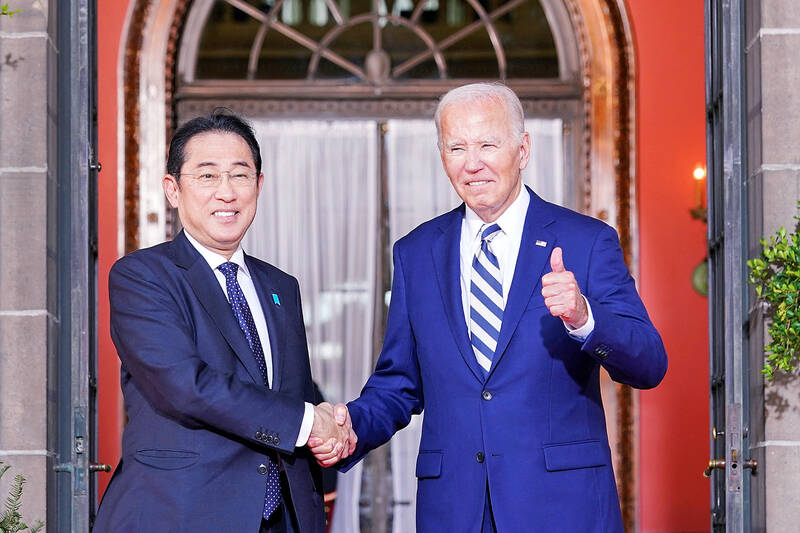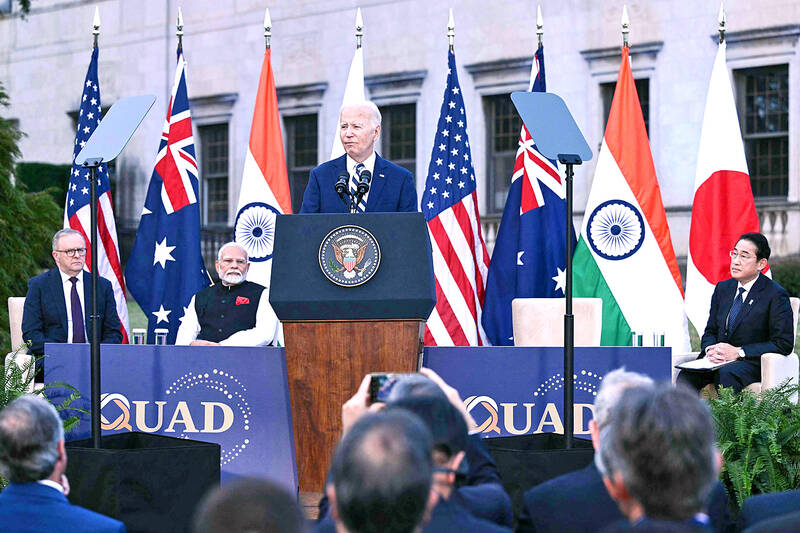US President Joe Biden and Japanese Prime Minister Kishida Fumio on Saturday reiterated their opposition to any attempt to change the “status quo” in the Taiwan Strait by force.
In a wide-ranging, one-on-one conversation on Saturday morning, the leaders “reiterated their resolve to maintain peace and stability across the Taiwan Strait” and “underscored their opposition to any attempts to change the status quo by force,” a White House news release on the meeting said.
They also “discussed their respective diplomacy with the People’s Republic of China (PRC) and their shared concerns about the PRC’s coercive and destabilizing activities, including in the South China Sea,” it said.

Photo: Reuters
In addition to discussing their dedication to developing and protecting technologies such as artificial intelligence and semiconductors, they also “committed to sustain efforts to take the US-Japan Alliance to new heights and to continue standing side-by-side together as steadfast global partners.”
The gathering was also an opportunity for them to bid each other farewell, as Biden would leave office in January, while Kishida last month announced that he would step down.
Biden on Saturday also hosted Kishida, Australian Prime Minister Anthony Albanese and Indian Prime Minister Narendra Modi in his hometown of Wilmington, Delaware, for the fourth in-person Quadrilateral Security Dialogue (Quad) leaders’ summit.

Photo: AFP
The Wilmington Declaration Joint Statement released after the summit said that they “unequivocally stand for the maintenance of peace and stability across this dynamic region, as an indispensable element of global security and prosperity.”
They also said that they “strongly oppose any destabilizing or unilateral actions that seek to change the status quo by force or coercion” and “condemn the dangerous use of coast guard and maritime militia vessels, including increasing use of dangerous maneuvers.”
In Taipei, the Ministry of Foreign Affairs yesterday expressed its gratitude to the US, Japan and like-mined countries for restating the importance of maintaining peace and stability in the Taiwan Strait and the region.
Their statements again demonstrated that the international community is highly concerned about peace and stability in the Indo-Pacific region, it said.
“As a responsible member of the Indo-Pacific, Taiwan will continue to work with like-minded partners to safeguard peace, stability, and prosperity in the Taiwan Strait and throughout the Indo-Pacific,” it added.
Meanwhile, at Saturday’s Quad meeting, Biden was caught on a hot mic telling the leaders that an aggressive China is “testing us,” in remarks that risked undercutting the summit declaration that carefully avoided mentioning Beijing by name.
“China continues to behave aggressively, testing us all across the region,” Biden was heard in what were supposed to be behind-closed-doors remarks.
Biden said that while Chinese President Xi Jinping (習近平) was focusing on “domestic economic challenges,” he was also “looking to buy himself some diplomatic space, in my view, to aggressively pursue China’s interest.”
The hot mic blunder risked undermining careful diplomatic efforts by all four countries during the summit to insist that their grouping is about more than just providing a counterweight to China.
Additional reporting by AFP

CHAOS: Iranians took to the streets playing celebratory music after reports of Khamenei’s death on Saturday, while mourners also gathered in Tehran yesterday Iranian Supreme Leader Ayatollah Ali Khamenei was killed in a major attack on Iran launched by Israel and the US, throwing the future of the Islamic republic into doubt and raising the risk of regional instability. Iranian state television and the state-run IRNA news agency announced the 86-year-old’s death early yesterday. US President Donald Trump said it gave Iranians their “greatest chance” to “take back” their country. The announcements came after a joint US and Israeli aerial bombardment that targeted Iranian military and governmental sites. Trump said the “heavy and pinpoint bombing” would continue through the week or as long

TRUST: The KMT said it respected the US’ timing and considerations, and hoped it would continue to honor its commitments to helping Taiwan bolster its defenses and deterrence US President Donald Trump is delaying a multibillion-dollar arms sale to Taiwan to ensure his visit to Beijing is successful, a New York Times report said. The weapons sales package has stalled in the US Department of State, the report said, citing US officials it did not identify. The White House has told agencies not to push forward ahead of Trump’s meeting with Chinese President Xi Jinping (習近平), it said. The two last month held a phone call to discuss trade and geopolitical flashpoints ahead of the summit. Xi raised the Taiwan issue and urged the US to handle arms sales to

BIG SPENDERS: Foreign investors bought the most Taiwan equities since 2005, signaling confidence that an AI boom would continue to benefit chipmakers Taiwan Semiconductor Manufacturing Co’s (TSMC, 台積電) market capitalization swelled to US$2 trillion for the first time following a 4.25 percent rally in its American depositary receipts (ADR) overnight, putting the world’s biggest contract chipmaker sixth on the list of the world’s biggest companies by market capitalization, just behind Amazon.com Inc. The site CompaniesMarketcap.com ranked TSMC ahead of Saudi Aramco and Meta Platforms Inc. The Taiwanese company’s ADRs on Tuesday surged to US$385.75 on the New York Stock Exchange, as strong demand for artificial intelligence (AI) applications led to chip supply constraints and boost revenue growth to record-breaking levels. Each TSMC ADR represents

Pro-democracy media tycoon Jimmy Lai’s (黎智英) fraud conviction and prison sentence were yesterday overturned by a Hong Kong court, in a surprise legal decision that comes soon after Lai was jailed for 20 years on a separate national security charge. Judges Jeremy Poon (潘兆初), Anthea Pang (彭寶琴) and Derek Pang (彭偉昌) said in the judgement that they allowed the appeal from Lai, and another defendant in the case, to proceed, as a lower court judge had “erred.” “The Court of Appeal gave them leave to appeal against their conviction, allowed their appeals, quashed the convictions and set aside the sentences,” the judges